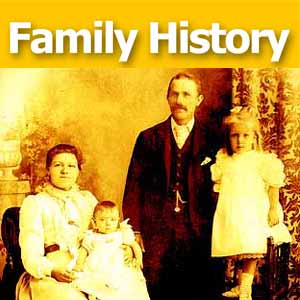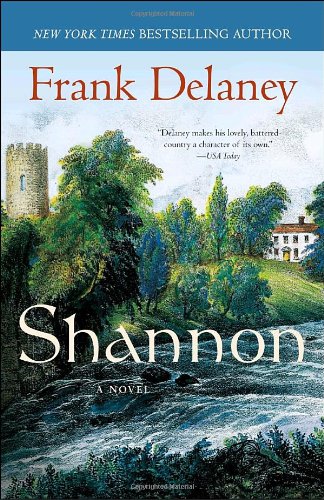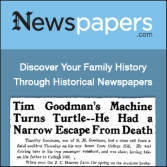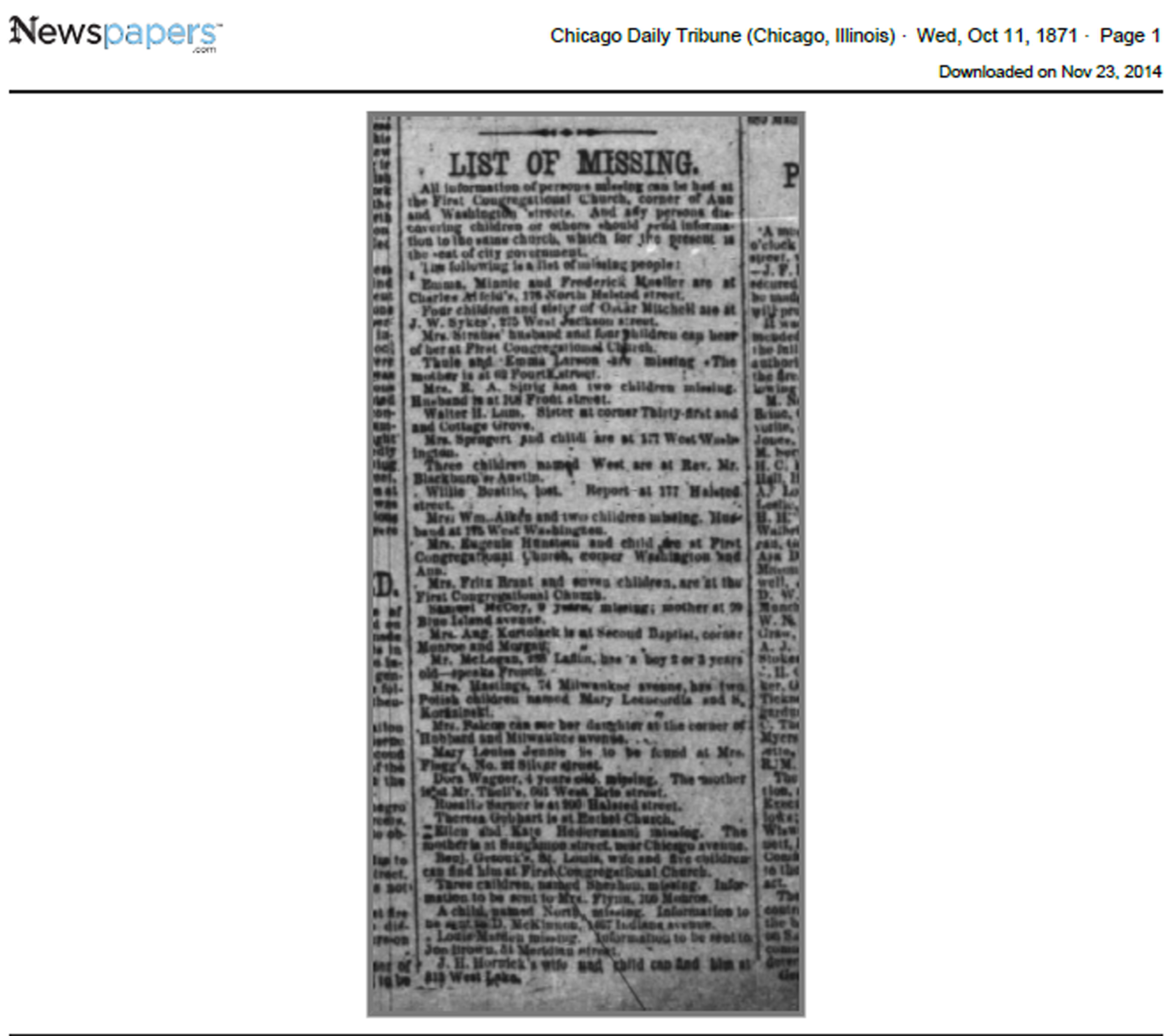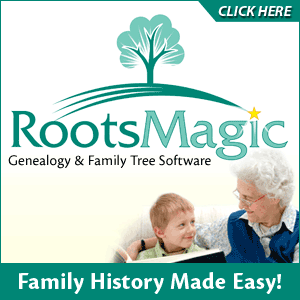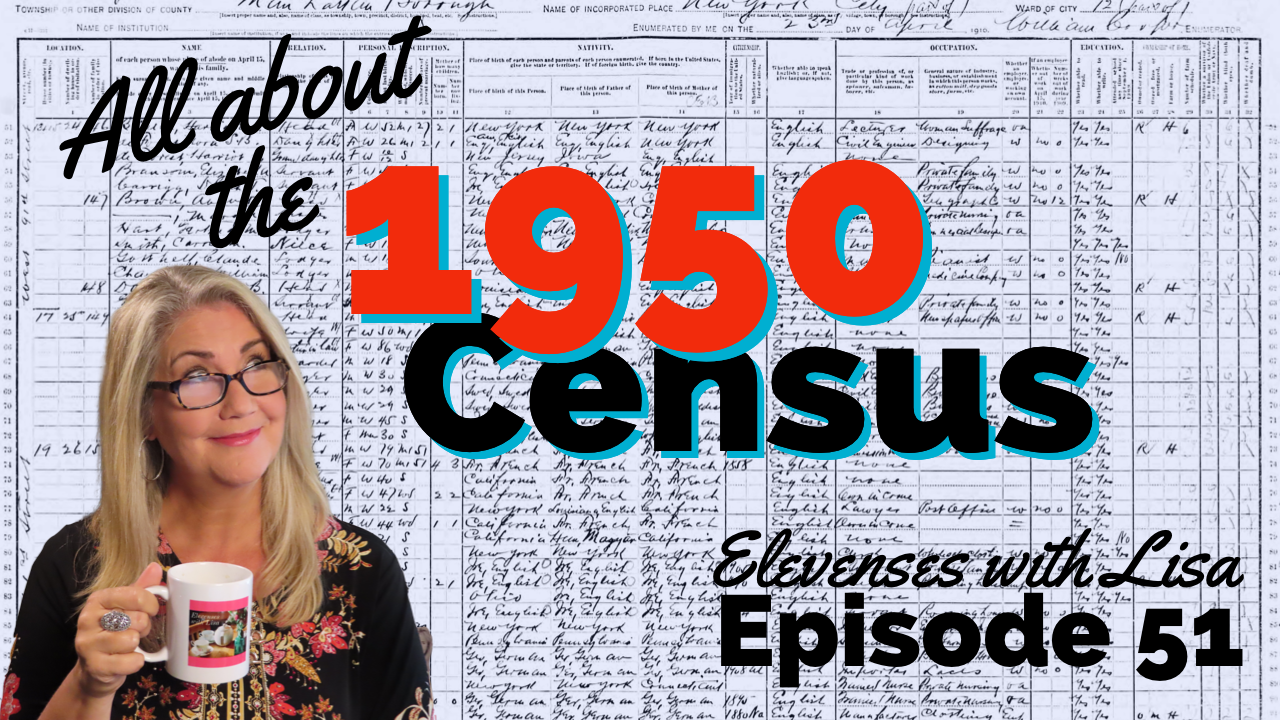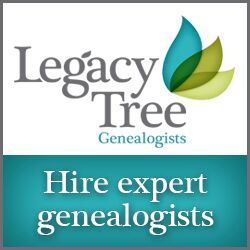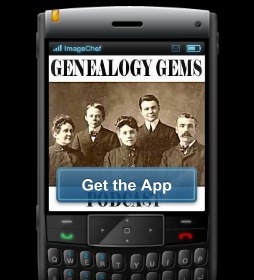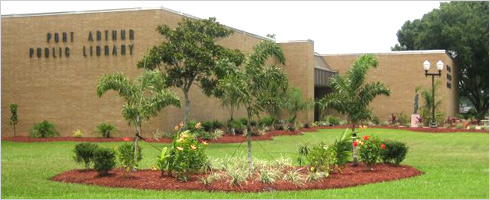Genealogy Gems Podcast Episode 210
with Lisa Louise Cooke
In this episode:
- You’ve heard of “burned counties,” a phrase used to describe places where courthouse fires or other disasters have destroyed key genealogy records? In this episode, a listener presents the problem of her burned city?Chicago.
- Your DNA Guide Diahan Southard shares some of the latest buzz about DNA health reports you can get with your DNA tests for family history?and some opinions about them
- News from the Genealogy Gems Book Club
- Get-started Swedish genealogy tips from Legacy Tree Genealogist Paul Woodbury
- The Archive Lady Melissa Barker shines the spotlight on archival collections that haven’t even been processed yet (and suggestions for getting to them)
- Five years away from the release of the 1950 US census, Lisa has tips on researching your family in the 1940s and preparing for its release
MAILBOX: GEMS FOR YOU AND YOUR SOCIETY
Gail mentioned the free step-by-step Family History: Genealogy Made Easy Podcast
Great news! Your genealogy society or group may reprint articles from Lisa Louise Cooke’s Genealogy Gems blog! Click here to learn more.
MAILBOX: GENEALOGY GEMS BOOK CLUB
Shannon by Frank Delaney and Ireland by Frank Delaney
(Thank you for supporting the free podcast by using our links to get your copies of these books.)
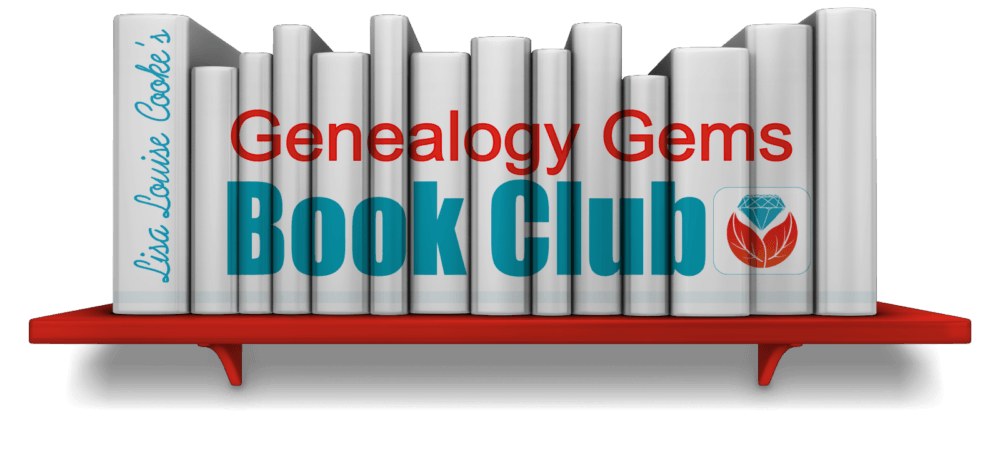
Book Club Guru Sunny Morton recommends the novels of Frank Delaney, beginning with Shannon (and now she’s reading Ireland). Frank is a master storyteller, and family history themes wind throughout his stories. Tip: he narrates his audiobooks himself. They are well worth listening to! But they’re so beautifully written Sunny is buying them in print, too.
MAILBOX: THE GREAT CHICAGO FIRE
Resource: Newspapers.com
“Burned county” research tips
Sam Fink’s list (an index of Cook County marriages and deaths)
Recommended:
- Family History Podcast episode #37: “I discussed a book specifically on Chicago research: Finding Your Chicago Ancestors: A Beginners Guide To Family History In The City Of Chicago by Grace DuMelle. As I recall, it was a very comprehensive book and could give you good leads on where to look.”
- Premium Podcast Episode 143: Johnstown Flood story
- Premium Podcast episode 145: Eastland disaster story and tips on researching disasters in your family history
- Fire, Flood or Earthquake? 5 Tips for Researching Disasters in Your Family History (includes mention of GenDisasters)
Lisa Louise Cooke uses and recommends RootsMagic family history software. From within RootsMagic, you can search historical records on FamilySearch.org, Findmypast.com and MyHeritage.com. RootsMagic is now fully integrated with Ancestry.com: you can sync your RootsMagic trees with your Ancestry.com trees and search records on the site.
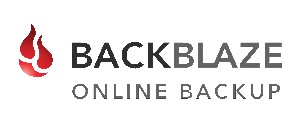 Keep your family history research, photos, tree software files, videos and all other computer files safely backed up with Backblaze, the official cloud-based computer backup system for Lisa Louise Cooke’s Genealogy Gems. Learn more at https://www.backblaze.com/Lisa.
Keep your family history research, photos, tree software files, videos and all other computer files safely backed up with Backblaze, the official cloud-based computer backup system for Lisa Louise Cooke’s Genealogy Gems. Learn more at https://www.backblaze.com/Lisa.
ARCHIVE LADY: UNPROCESSED RECORDS
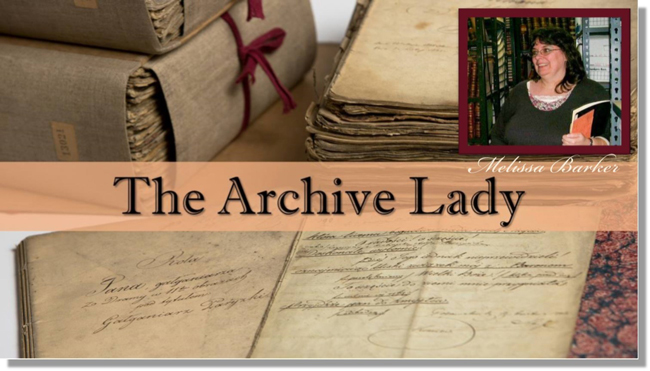 As an archivist, working in an archive every day, I get very excited when someone walks through the door with a records donation in hand. Many of our archives would not have the genealogical and historical records they have without the generosity of others that make records donations. Archives receive donations of documents, photographs, ephemera, and artifacts almost on a daily basis.
As an archivist, working in an archive every day, I get very excited when someone walks through the door with a records donation in hand. Many of our archives would not have the genealogical and historical records they have without the generosity of others that make records donations. Archives receive donations of documents, photographs, ephemera, and artifacts almost on a daily basis.
Many archives have back rooms full of unprocessed and uncatalogued records collections. Sometimes they are even sitting in the original boxes they were donated. These records collections have not been microfilmed, they are not online anywhere but they exist and the genealogist needs to seek them out.
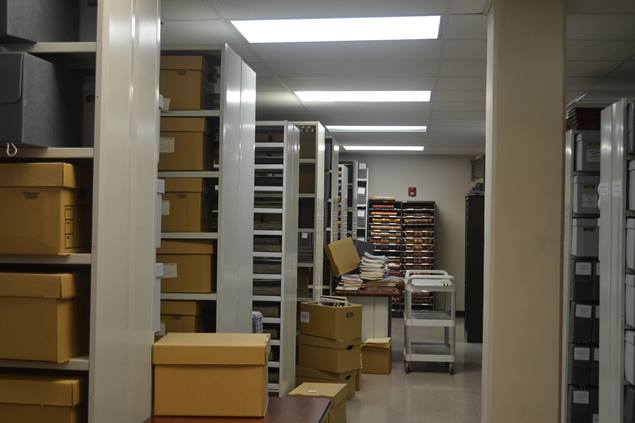
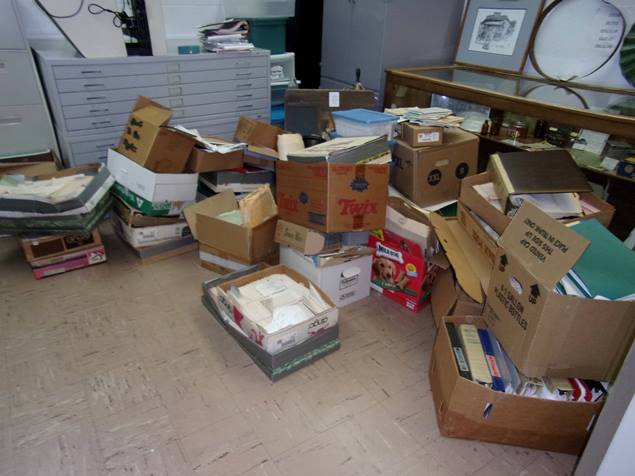
Images courtesy of Melissa Barker and Houston County, TN Archives.
Many times record collections haven’t even been processed yet but the archivist might let you look through a specific collection. Be prepared, sometimes the archivist doesn’t allow patrons to view unprocessed collections. But like I always say “It doesn’t hurt to ask!” The archivist should know what they have in those collections and should be able to help you decide if a particular collection will be of help to you and your genealogy research.
The answer to your genealogical question could be sitting in a box of unprocessed records. I like to always encourage genealogists to put “unprocessed records” on their to-do list. As genealogists, we should leave no stone or box of records, unturned.
DNA WITH DIAHAN: MORE DNA HEALTH REPORTS
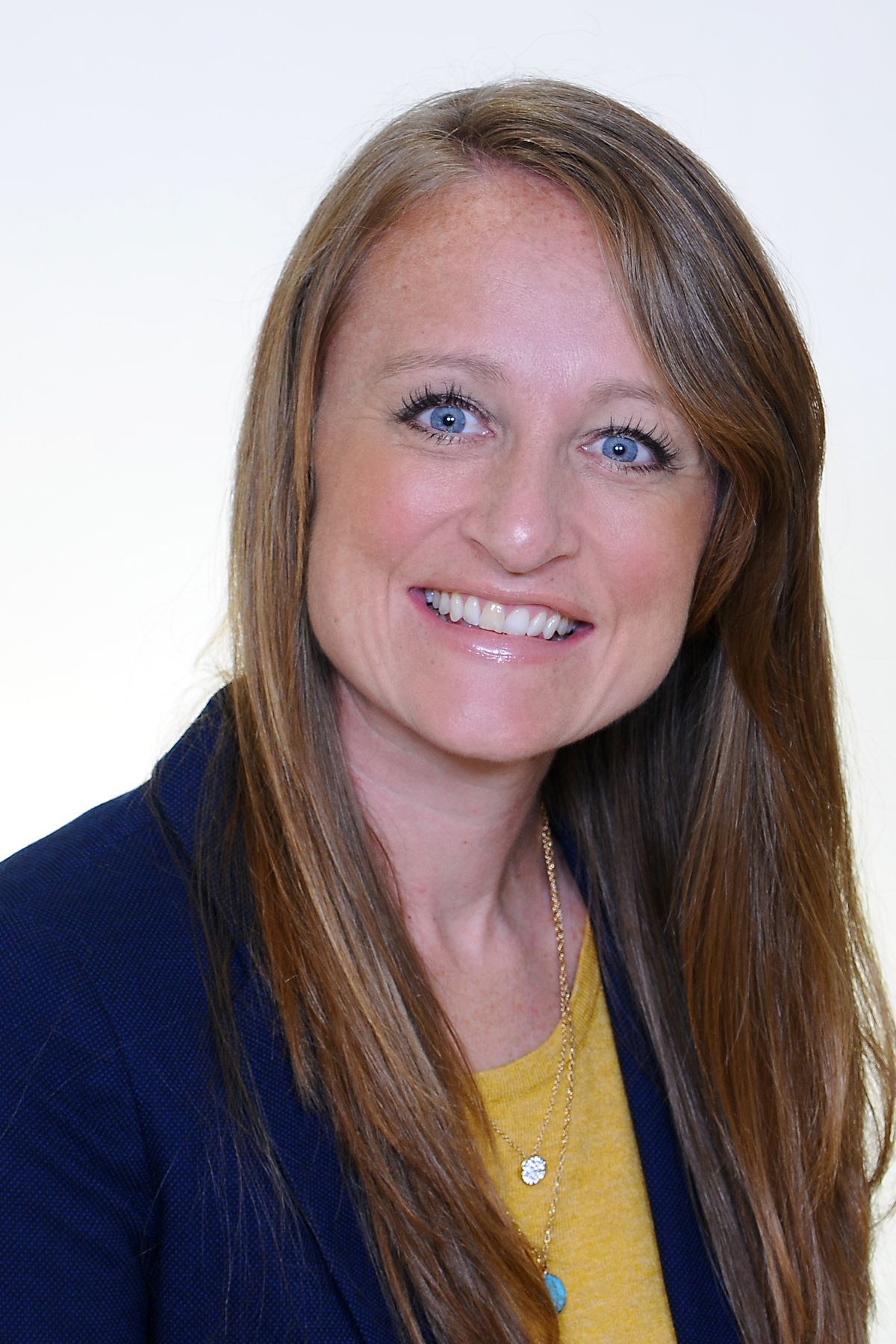 Recently, Family Tree DNA offered its customers a new $49 add-on product: a wellness report that promises to “empower you to make more informed decisions about your nutrition, exercise, and supplementation.” The report comes via a partnership with Vitagene, a nutrigenomics company.
Recently, Family Tree DNA offered its customers a new $49 add-on product: a wellness report that promises to “empower you to make more informed decisions about your nutrition, exercise, and supplementation.” The report comes via a partnership with Vitagene, a nutrigenomics company.
How does it work? When you order the report, Family Tree DNA shares the results of your Family Finder test with Vitagene and gives you a lifestyle questionnaire. According to the site, “this information, along with your DNA raw data results, will be analyzed using the latest research available in the areas of nutrition, exercise, and genomics. You can expect your results to be available on your dashboard within one week of purchase.”
At this point, the test is only available to those who have taken the Family Tree DNA Family Finder DNA test (we called to check with them specifically about those who transfer their DNA to Family Tree DNA, but the Wellness Report isn’t available to them, either). Those who qualify will see a Wellness Report upgrade option on their Family Tree DNA dashboard:
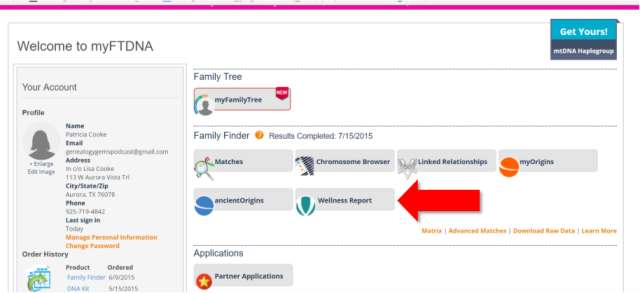
There are several components to the Family Tree DNA and Vitagene Wellness Report. The site describes them as follows:
Nutrition Report. “Personalized, actionable recommendations designed to help you reach your weight goals. Learn how your DNA affects traits such as obesity risk, emotional eating, weight regain after dieting, and more. Included Reports: Obesity Risk, Alcohol Metabolism, Cholesterol Levels, Triglyceride Levels, Lactose Sensitivity, Gluten Sensitivity, Emotional Eating, Weight Regain After Dieting, Fat Intake, Sodium Intake.”
Exercise Report. “Outlines the optimal physical activities for your body to start seeing better results, faster. Included Reports: Power and Endurance Exercise, Muscle Strength, Muscle Cramps, Exercise Behavior, Blood Pressure Response to Exercise, Weight Response to Exercise.”
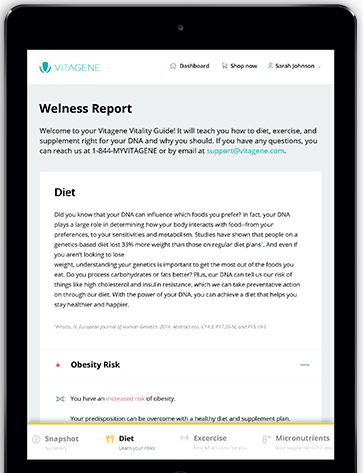
Supplementation Report. “Reveals which deficiencies you are more inclined to suffer from and recommends a supplement regimen that will help keep you healthy and feeling 100%. Included Reports: Full Supplementation Regimen, Vitamin D Intake, Vitamin A Intake, Folate Intake, Vitamin B12 Intake, Iron Intake.”
And what about your privacy? According to Family Tree DNA’s Q&A, “Your data is 100% secure and protected by industry standard security practices. We will not share your information without your explicit consent.”
This is just one of many services that are cropping up or will crop up in the future to offer additional interpretations of our DNA test results. (23andMe was the first major company in the genealogy space to offer these. Click here to read about their health reports, and click here and here to read about the company’s long road to FDA approval.)
Essentially, each DNA test you do for family history looks at a certain number of your SNPs, or little pieces of DNA (not your entire genome, which is costly and isn’t necessary for genetic genealogy purposes). A nutrigenomic profile compares your SNPs with SNPs known to be associated with various conditions or ailments. (These genetic markers have been identified by researchers, many in academia, and deposited in ClinVar, a large, publicly-accessible database that itself is part of an even larger genetic database, SNPedia.) In this case of Vitagene, they are likely mining ClinVar for specific places in your DNA that pertain to nutrition, and were also evaluated as part of the Family Finder test.
Of course, many factors affect your health, nutrition, exercise capacity, and other wellness indicators, not just your genes. The purpose of reports like these is to give you just one more piece of information to weigh personally or with your health care provider.
When considering whether to purchase a nutrigenomics report such as this, I’d look carefully at what’s promised in the report, as well as the company providing it and the cost. Vitagene does also sell vitamin supplements, so they have a clear motivation to tell you about what supplements to take. And, for your information, Vitagene also offers this $49 health report for AncestryDNA and 23andMe customers.
Of course, if it is health advice you want, for only $5 you can turn to Promethease.com and receive a health report?based on any testing company’s autosomal DNA report?that includes some nutritional factors. (I’ve blogged recently about Promethease and another inexpensive recommendation for DNA health reports. Click here to read it!) Or, I will just tell you right now, for free, without even looking at your DNA: Exercise more and eat more green vegetables and less ice cream. There. I just saved you some money. You’re welcome.
GEM: COUNTDOWN TO THE 1950 CENSUS: 5 TIPS
Get a copy of a census record for yourself or a relative (1950-2010). This costs $65 per person, per census year. In addition to genealogy uses, census records are legally-recognized documents to prove your identity, citizenship or age if you’re applying for a passport and you’ve lost your birth certificate or other situations like that. Order it through the “Age Search Service” offered through the US Census Bureau.
Video tutorial: How to obtain a copy of your census record
Find your family in all possible records before and during WWII
- City directories, WWII draft registrations, military yearbooks, the US Public Records Index, military enlistments, and even alien registrations or internment camp records for foreign-born residents during WWII.
- WWII-era newspapers: Searching for coverage
- Finding family history in WWII-era newspapers: Narrowing the results
5 places to find city directories:
- “U.S. City Directories, 1822-1995” at Ancestry.com (subscription required)
- City Directories of the United States
- Library of Congress
- WorldCat.org to see holdings at different libraries (may require copy service request, since originals may not circulate through interlibrary loan)
- Local public libraries/societies
Find your family in all possible records AFTER the war
- City directories, yearbooks, deeds, divorce records (the divorce rate went up after WWII)
- Post-WWII draft registrations: Click here to order copies of draft registration records for men born 1897-1957. Requires full name of applicant, address at time of registration (tip: get it from a city directory).
Help create location tools for the 1950 US Census
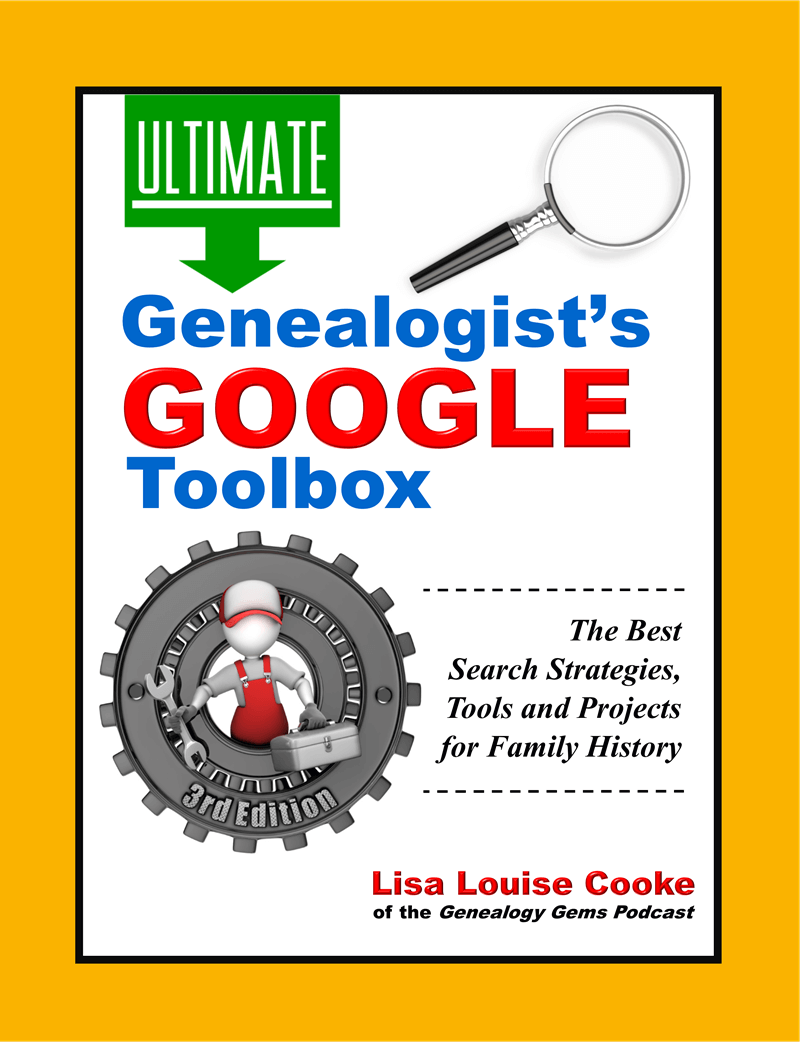
Available in the Genealogy Gems Store
Google your family’s history during the 1940s and 1950s
- Google Earth for Genealogy (FREE)
- Premium video: Ultimate Google Search Strategies for the Family Historian
- The Genealogist’s Google Toolbox by Lisa Louise Cooke (there’s an entire chapter on YouTube) Available at the Genealogy Gems Store.
Follow-up your discoveries with Google and YouTube search questions. Example: You find your grandmother working as a telephone operator in the 1940s in a city directory. What would her job have been like? Search YouTube:
YouTube videos on 1940s telephone operators
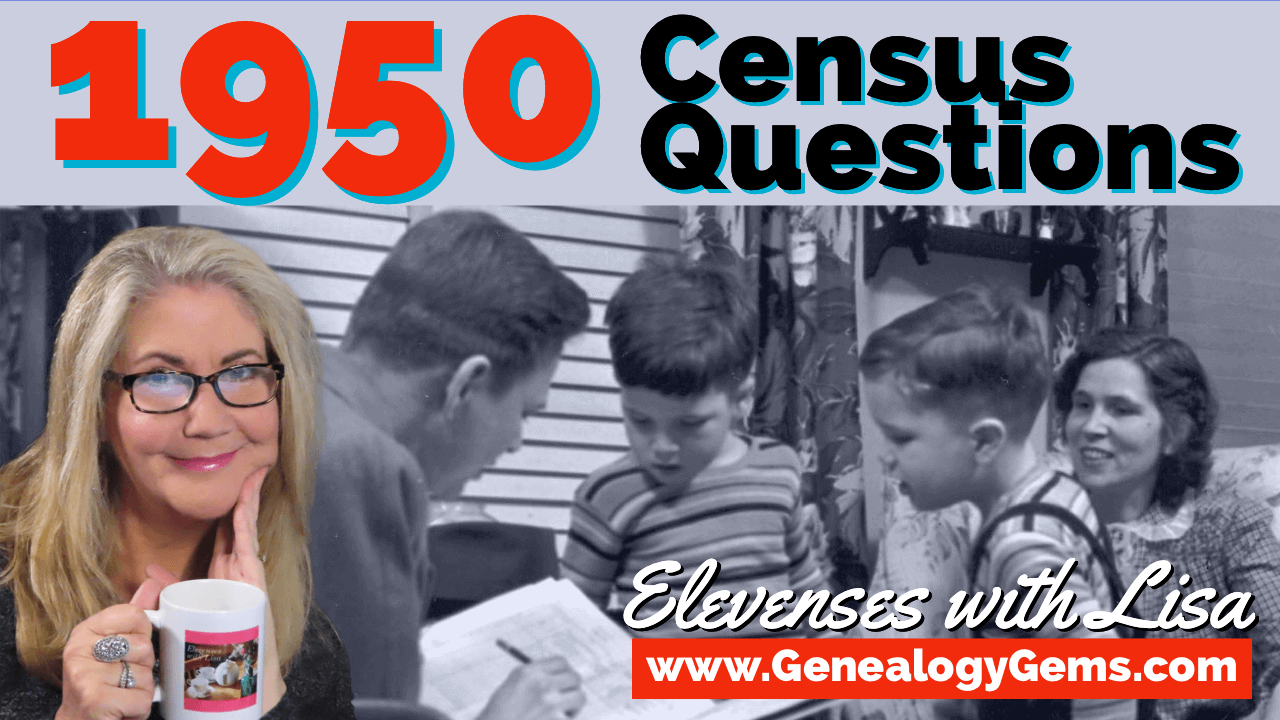
Watch Elevenses with Lisa episode 53 1950 Census Questions
LEGACY TREE TIP: START YOUR SWEDISH GENEALOGY
Click here to read Paul Woodbury’s tips on the Genealogy Gems website.
PROFILE AMERICA: THE OPEN ROAD
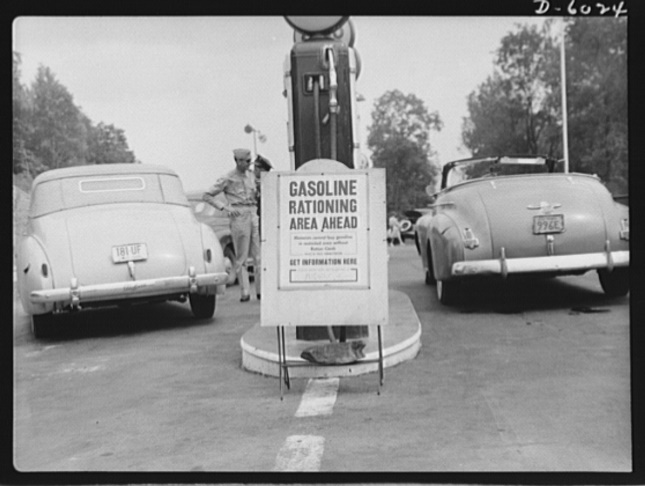
Gasoline Rationing
“The busiest spot on the Pennsylvania Turnpike,” Library of Congress photograph; image courtesy of Wikimedia Commons. Click here to see full citation.
BONUS CONTENT for Genealogy Gems App Users
If you’re listening through the Genealogy Gems app, your bonus content for this episode is a lightning-quick tech tip from Lisa Louise Cooke on how to undo that last browser you just closed and didn’t mean to! The Genealogy Gems app is FREE in Google Play and is only $2.99 for Windows, iPhone and iPad users
PRODUCTION CREDITS
Lisa Louise Cooke, Host and Producer
Sunny Morton, Editor
Diahan Southard, Your DNA Guide, Content Contributor
Hannah Fullerton, Audio Editor
Lacey Cooke, Service Manager
FREE NEWSLETTER:
Subscribe to the Genealogy Gems newsletter to receive a free weekly e-mail newsletter, with tips, inspiration and money-saving deals.
Resources
New Genealogy Records and Updates
Here are the important system and records updates from industry leaders. Each new feature and record offers a new opportunity to learn more about your family history. Let’s get started!

MyHeritage Updates
MyHeritage announced an update their Related Records features on December 16, 2019. Here’s the latest from their blog:
“We recently revamped Related Records in SuperSearch™ to ensure that you don’t miss any important historical records that can lead you to new discoveries.
Related Records, previously known as Record Detective™, shows additional records or family tree profiles that might belong to the person or people featured in the historical record you are currently viewing.
The technology scans the record you’ve discovered in SuperSearch™ and matches it to our entire database of over 10.2 billion historical records and family tree profiles to locate related records.
For example, a birth record could point to a newspaper article about the wedding of the same person, where you could learn about new family members that you weren’t aware of.
To make Related Records more practical and ensure that you won’t miss them, we now show them in a convenient panel on the right-hand side of the record instead of below it.
Related Records are generated by MyHeritage’s record-to-record matching technology, and we’ve just re-calculated these matches, adding hundreds of millions of additional Related Records. This will open the door to many new and exciting discoveries.”
MyHeritage Records
MyHeritage has also been busy adding new records:
Germany, War Graves Index, 1902-1961
An index of 4,234,266 records
“This index of over 4.2 million records containing information on German soldiers and civilians who died in wars or military operations between 1902 and 1961.
Many of the records are for soldiers killed during World War I or World War II. While the amount of information in each record varies, the vast majority of records contain the following searchable data: first and last name, date of birth, date of death, and place of death. Some records also include birth place, burial place, and military rank.
The burial place is seldom recorded, but when available it can provide valuable information about the location of the grave.
While this is largely an early 20th-century military death index, many women are present in this collection.
In the case of soldiers who went missing, the date of death field may refer to the date on which they went missing. Similarly, the place of death may refer to the place from which they went missing.”
Australia, Military Lists and Awards
An index of Australian military rolls.
960,081 records
United States, Index of Burials, 1900-2019
An index of records from various cemeteries located in the United States.
492,002 records
Australia, Index of Burials, 1900-2019
An index of records from various cemeteries located in Australia.
438,587 records
England & Wales, Prerogative Court of Canterbury, Index of Will Registers, 1384-1858
An index of wills proved before the Prerogative Court of Canterbury and other jurisdictions.
979,653 records
United Kingdom, Royal Navy Ratings’ Service Records, 1853-1928
An index of Royal Navy service records for ratings who entered the service between 1853 and 1928.
803,684 records
United Kingdom, Registry of Shipping and Seamen: Royal Navy Reserve Ratings’ Records of Service, 1908-1958
An index of service record cards of Royal Naval Reserves, mainly those who served during the First World War.
129,896 records
United Kingdom, Royal Air Force Officers’ Index, 1918-1919
An index of service records of those who served in the Royal Air Force (RAF) during the First World War (1914–1918).
101,411 records
United Kingdom, Royal Marines’ Service Records, 1842-1925
An index of service registers of men who joined the Royal Marines between 1842 and 1925.
112,012 records
United Kingdom, Index of Merchant Seamen’s Campaign Medals, 1939-1945
An index of 108,387 records
United Kingdom, Index of Merchant Seamen’s Campaign Medals, 1914-1918
An index of recipients of British War Medals, Mercantile Marine Medals, and Silver War Badges issued to merchant seamen and officers in the First World War.
157,424 records
United Kingdom, Recommendations for Military Honours and Awards, 1935-1990
An index of recommendations for military honors and awards between 1935 and 1990 to British Army personnel and army personnel from British dominions.
78,497 records
United Kingdom, Royal Navy Officers’ Service Records, 1756-1931
An index of service records for officers who joined the Royal Navy between 1756 and 1931.
66,686 records
United Kingdom, Royal Navy Volunteer Reserve Index, 1903-1922
An index of First World War service records for officers and ratings of the Royal Naval Volunteer Reserve (RNVR).
59,784 records
United Kingdom, Index of Death Duty Registers, 1796-1811
An index of 51,146 records
United Kingdom, Admiralty and War Office: Royal Naval Division: Records of Service, 1914-1919
An index of service records of ratings and officers in the Royal Naval Division (RND) during the First World War.
50,017 records
Click here to search for these records at MyHeritage.
FamilySearch Records
FamilySearch has also continued to add indexed records. Most are to existing collections, but some are new collections. Here’s what they announced on December 9, 2019.
SALT LAKE CITY, UT—New, free, historical records were added to FamilySearch.org from American Samoa, Brazil, Chile, Colombia, Costa Rica, England, France, Ireland, Italy, Netherlands, New Zealand, Peru, Puerto Rico, South Africa, Venezuela and the United States. Over 800,000 records were added from the Cape Province of Africa (1895-1972.)
American Samoa
American Samoa, Vital Records, 1850-1972
3,550 indexed records
Added indexed records to an existing collection
Brazil
Brazil, Santa Catarina, Civil Registration, 1850-1999
8,512 indexed records
Added indexed records to an existing collection
Chile
Chile, Catholic Church Records, 1710-1928
7,707 indexed records
Added indexed records to an existing collection
Colombia
Colombia, Bogotá, Burial Permits, 1960-1991
79,631 indexed records
Added indexed records to an existing collection
Croatia
Croatia, Delnice Deanery Catholic Church Books, 1725-1926
2,870 indexed records
Added indexed records to an existing collection
Costa Rica
Costa Rica, Civil Registration, 1823-1975
151,856 indexed records
Added indexed records to an existing collection
England
England, Herefordshire Bishop’s Transcripts, 1583-1898
599 indexed records
Added indexed records to an existing collection
England, Huntingdonshire Parish Registers
52,367 indexed records
Added indexed records to an existing collection
England, Oxfordshire Parish Registers 1538-1904
51,159 indexed records
Added indexed records to an existing collection
England, Yorkshire Marriage Bonds and Allegations, 1613-1887
2,587 indexed records
Added indexed records to an existing collection
England, Cambridge Parish Registers, 1538-1983
468,063 indexed records
Added indexed records to an existing collection
France
France, Vienne, Military Draft Cards, 1867-1921
3,633 indexed records
Added indexed records to an existing collection
Ireland
Ireland, James Alexander Henderson, The Belfast and Province of Ulster Directory for 1856
37,363 indexed records
New indexed records collection
Ireland, Thom’s Irish Almanac & Official Directory 1868
103,355 indexed records
New indexed records collection
Northern Ireland, Tithe Applotment Books, 1822-1837
175,575 indexed records
New indexed records collection
Ireland and Britain, Transatlantic Migration from North America, 1858-1870
42,695 indexed records
New indexed records collection
Ireland, Thom’s Official Directory of the United Kingdom of Great Britain and Ireland, 1894, Irish Section
121,181 indexed records
New indexed records collection
Ireland, Thom’s Official Directory, 1910
131,734 indexed records
New indexed records collection
Italy
Italy, Trieste, Civil Registration (State Archive), 1924-1944
100 indexed records
New indexed records collection
Netherlands
Netherlands, Archival Indexes, Vital Records, 1600-2000
101,765 indexed records (over several weeks)
Added indexed records to an existing collection
New Zealand
New Zealand, Archives New Zealand, Probate Records, 1843-1998
637 indexed records
Added indexed records to an existing collection
Peru
Peru, Amazonas, Civil Registration, 1935-1999
26,959 indexed records
Added indexed records to an existing collection
Peru, Ayacucho, Civil Registration, 1903-1999
1,394 indexed records
Added indexed records to an existing collection
Peru, Huánuco, Civil Registration, 1889-1997
23,227 indexed records
Added indexed records to an existing collection
Peru, Prelature of Yauyos-Cañete-Huarochirí, Catholic Church Records, 1665-2018
1,494 indexed records
Added indexed records to an existing collection
Peru, Tacna, Civil Registration, 1850-1998
193,495 indexed records
Added indexed records to an existing collection
Puerto Rico
Puerto Rico, Civil Registration, 1805-2001
714 indexed records
Added indexed records to an existing collection
South Africa
South Africa, Cape Province, Civil Deaths, 1895-1972
818,292 indexed records
Added indexed records to an existing collection
United States
Alabama
Alabama, Confederate Pension Applications, ca. 1880-1930’s
168,372 indexed records
Added indexed records to an existing collection
Alabama, County Birth Registers, 1881-1930
8,206 indexed records
Added indexed records to an existing collection
Arkansas
Arkansas Confederate Pensions, 1901-1929
96,713 indexed records
Added indexed records to an existing collection
California, San Francisco Arrivals
United States, California, List of United States Citizens Arriving at San Francisco, 1930-1949
434,995 indexed records
New indexed records collection
Georgia
Georgia, Chatham, Savannah, Laurel Grove Cemetery Record Keeper’s Book (colored), 1852-1942
24,094 indexed records
New indexed records collection
Georgia, Columbus, Linwood and Porterdale Colored Cemeteries, Interment Records, 1866-2000
28,946 indexed records
New indexed records collection
Georgia, County Delayed Birth and Death Records, 1870-1960
202 indexed records
Added indexed records to an existing collection
Hawaii
Hawaii, Board of Health, Marriage Record Indexes, 1909-1989
85,716 indexed records
Added indexed records to an existing collection
Hawaii, Hansen’s Disease Records, Kalaupapa Census Index, 1839-1970
2,336 indexed records
Added indexed records to an existing collection
Louisiana
Louisiana, New Orleans, Interment Registers, 1836-1972
133,660 indexed records
Added indexed records to an existing collection
Louisiana, Orleans Parish, Birth Records, 1819-1906
85,840 indexed records
Added indexed records to an existing collection
Louisiana, New Orleans Index to Passenger Lists, 1853-1952
151,894 indexed records
New indexed records collection
South Carolina
South Carolina, Charleston County, Charleston, Birth Registers, 1901-1926
14,132 indexed records
Added indexed records to an existing collection
Tennessee
Tennessee, Davidson County, Nashville City Cemetery Records, 1843-1962
18,187 indexed records
New indexed records collection
Tennessee, Shelby County, Memphis, Board of Health Death Records, 1848-1913
1,121 indexed records
Added indexed records to an existing collection
Texas
Texas, Harrison County Delayed Birth Records, 1860-1933
23 indexed records
Added indexed records to an existing collection
U.S. Obituaries
United States, GenealogyBank Historical Newspaper Obituaries, 1815-2011
8,829,622 indexed records
Added indexed records to an existing collection
Venezuela
Venezuela, Catholic Church Records, 1577-1995
109,788 indexed records
Added indexed records to an existing collection
FamilySearch Update
Also recently announced by FamilySearch:
FamilySearch Adds Ability to Document All Family Relationships
SALT LAKE CITY, UT (10 December 2019)
“The FamilySearch Family Tree now provides the ability for users to document all family relationships, including same-sex relationships.”
(FamilySearch) “encourages genealogical accuracy based on original source records and contains over a billion user-contributed lineage-linked records. Patrons are now able to document same-sex relationships, including same-sex marriages and same-sex adoptions.”
“When adding a spouse or parent to the FamilySearch Family Tree, the user can now add a spouse or parent of the same sex. The Family Tree mobile app will also support this new capacity after users install the necessary updates.”
Official Statement from The Church of Jesus Christ of Latter-day Saints
Ancestry Record Updates
Here are the latest new and updated historical genealogy records from Ancestry:
Updated:
Australia and New Zealand, Find A Grave Index, 1800s-Current
Updated:
U.S., Find A Grave Index, 1600s-Current
Updated:
Brazil, Find A Grave Index, 1800s-Current
New:
New York State, Card Index to Supreme Court and Court of Chancery Documents, 1648-1848
New:
Milwaukee, Wisconsin, Marriages, 1838-1911
New:
Milwaukee, Wisconsin, Births, 1839-1911
New:
Milwaukee, Wisconsin, Deaths, 1854-1911
Updated:
Norway, Find A Grave Index, 1800s-Current
Updated:
Sweden, Find A Grave Index, 1800s-Current
Updated:
Italy, Find A Grave Index, 1800s-Current
New Jersey Death Index and More US Genealogy Records Online
The New Jersey Death Index tops this week’s list of new and updated U.S. genealogy records online. Along with a Native American census collection, our list includes family history records for Georgia, Illinois, New York, North Carolina, Tennessee and Virginia. Among...Disaster Recovery for Genealogy: “Think About the Things That Matter Most”
Damage reports are surfacing in the aftermath of Hurricane Harvey. Today we discuss how two Texas library collections have fared, and disaster recovery strategies for genealogy researchers. I’ve got a fantastic get-started video tip for those trying to rescue documents, photos, and other family heirlooms–and the two steps everyone should take to protect their priceless genealogical collections.
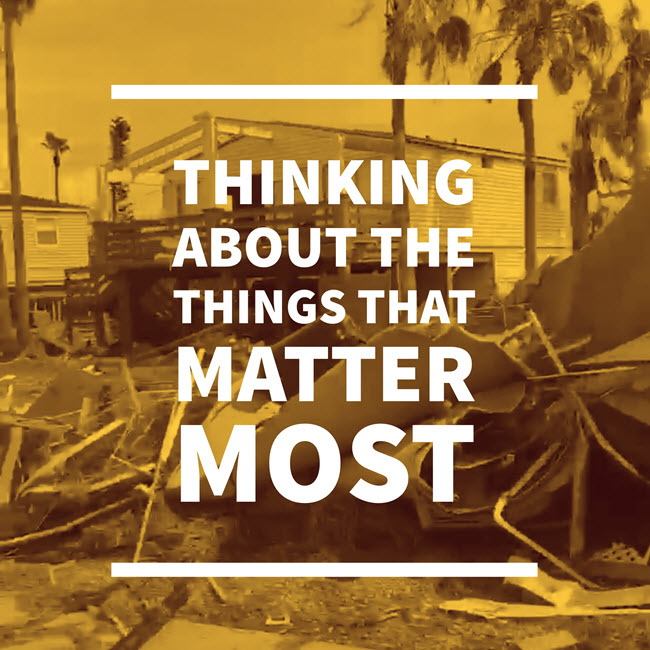
Port Aransas, Texas
My heart goes out to those who have been in the paths of Hurricanes Harvey and Irma recently. Knowing I live in Texas, many of you have asked how my family is doing. I’m happy to report that the storms didn’t reach those of us here north of Dallas. However, our daughter Hannah and her husband, while thankfully safe after evacuating from their home on the Texas shore, suffered the loss of their car and other possessions, and Hannah’s workplace was destroyed. They are now part of the relief and recovery efforts, and look forward to when they will be able to return to their home, which is currently uninhabitable. We feel very blessed that they are safe and sound, and our prayers go out to all who suffered losses.
Disaster Recovery for Genealogy Libraries

Clayton Library Center for Genealogical Research, Houston, TX. Wikimedia Commons image; click to view.
As lives are secured and order begins to be restored in devastated areas, I’ve wondered how various genealogy libraries and archives have fared. Genealogy Gems listener Chris emailed me with an alert that the Clayton Library Center for Genealogical Research in Houston, Texas has suffered some damage. “So sad for genies!” she writes. Indeed! The Clayton is one of the top public library genealogy research centers in the United States.
Not wanting to disturb their recovery efforts with a phone inquiry, I’ve turned to Google searching and social media for a status report. The Houston Public Library Foundation states that the Clayton is among one of 10 library locations that are “unable to open due to various building damages.” The Clayton Library Friends Facebook page offers more specifics–and this hopeful report:
“Yes, there was some flooding at Clayton Library and according to Susan Kaufman, Manager, Clayton Library is closed this week. Clayton Library staff will be deployed to other libraries that are open.
Clayton Library did suffer some water damage but it was not really that bad. They just need to decide how best to proceed since they were planning on doing renovations soon anyway.”
CityofHouston.news tells us what Clayton staff may be doing at other library branches: “The services and resources that are available at your library system include free access to WiFi and computers, one-on-one assistance with filling out applications and forms, and access to the expertise of library archivists who can assist you in preserving and saving precious family memorabilia such as books, letters and photographs that may have been damaged in the storm.”
Chris’ email encourages us to support the recovery effort for Houston’s libraries through the Houston Public Library Foundation: here’s the link she sent to their donation portal.
Down on the coast, another library system wasn’t so fortunate. The Port Arthur Library will remain closed for months, reports the Port Arthur News. “The Port Arthur Public Library was one of many buildings hit hard by Harvey,” states an article by L.V. Salinas. “It sustained flood damage and the subsequent mold issue inundated buildings often face afterward. It also sustained substantial damage and loss of property of its books, computer equipment, archives and more.”
Crews are working to clean up and preserve what they can. High priority is being given to their historical and genealogical resources: “One of the costlier processes was the freeze-drying of irreplaceable items like genealogy records, microfilm, Port Arthur historical photos and collections. The intent, as performed by companies contracted by the city, was to prevent any further damage from taking place, kill the bacteria that’s present and preserve the items long enough for a transference of information by experts.”
The Port Arthur History Collection is proudly described on the library website; it includes a collection of historic photos that were lovingly organized by volunteers and placed in archival-quality storage. “It’s one of our highest buy testosterone medication priorities,” states a library official in the article. “It’s time sensitive, and it has to happen now….We have to preserve it now.”
Disaster Recovery for Genealogy Researchers
As genealogists, we to have our personal and precious libraries and archives. We build trees in software–some of us spending hundreds or thousands of hours on them. We may have files, books, and other research materials. Many of us are family archivists: the stewards of priceless original family documents, photos, and other artifacts. Here’s some level-headed counsel for after a disaster strikes–and here’s what the rest of us should be doing now, before another disaster.
After a Disaster: Take It One Step at a Time
If you’ve been affected by a recent disaster, I’d like to share this fantastic, level-headed advice from Rennee Tallent, Galveston Historical Foundation’s Manager of Historic Collections (Galveston, Texas was hit by a hurricane in 1900–the “deadliest natural disaster in American history”):
I love her compassionate advice:
“Walking into [your home after a disaster] is very overwhelming. Try to take a deep breath and think about the things that matter most to you and what your priorities are. Take it one piece at a time: after you’ve finished that one, move on to the next.” -Rennee Tallent, Galveston Historical Foundation’s Manager of Historic Collections
Start your recovery efforts with whatever matters most to you, Renee says. But she reminds us that certain items are more vulnerable to destruction than others, so try to also focus on things made out of paper and photographs, then cloth, then wood. Leave your china, silver, and glassware until these other items have been stabilized.
Before Disaster Strikes: Digitize and Back It Up!
If a disaster strikes, most of us won’t have the time to grab all our genealogy research files, photographs, and other precious heirlooms. But many of these items are one-of-a-kind–unless we make them two-or-more-of-a-kind!
As family archivists, we can best preserve our past by:
- Digitizing it. Make high-quality digital scans of original documents and photos. Take digital pictures of three-dimensional heirlooms such as clothing, handicrafts, even quilts.
- Backing up your digital files. Should a disaster occur–whether storm, theft, or fire–your computer may suffer the same fate as any original documents and heirlooms in your home. So I recommend investing in an automated, cloud-based backup service for your computer.
 For a few dollars a month, a cloud-based backup service will continually back up your computer files to a remote server. In the event of any loss (including a computer crash), you can download them again. Having a digitized version of those original Civil War letters or photos isn’t quite the same as the real thing–but it’s so much better than having them disappear entirely. And if you’re like me, your computer doesn’t just house your photos and research files. It may have hundreds or even thousands of work files, personal files, music, or video files and more.
For a few dollars a month, a cloud-based backup service will continually back up your computer files to a remote server. In the event of any loss (including a computer crash), you can download them again. Having a digitized version of those original Civil War letters or photos isn’t quite the same as the real thing–but it’s so much better than having them disappear entirely. And if you’re like me, your computer doesn’t just house your photos and research files. It may have hundreds or even thousands of work files, personal files, music, or video files and more.
I use Backblaze for my personal computer and to back up thousands of Genealogy Gems audio, video, and other files. Backblaze is made for everyday consumers: it’s affordable and easy to use. Do your research yourself and choose the best cloud-based backup for you (click here to read the 8 features you should be watching for).
Our Service “Happiness” Manager, Lacey, experienced first hand the benefits of having her computer backed up:
Right after our Genealogy Gems seminar in Dallas in early August, I came home, sat down to work, and discovered my laptop had died. I tried everything I could find to get it going again (thanks to Google search results) but it couldn’t be revived. Thankfully, I had both Backblaze and Dropbox installed on my computer, and I didn’t lose any files at all. I was able to get everything back! Even my Google account saved all of my settings and bookmarks for my Chrome browser, so when I got my new computer, just about everything was restored as though nothing had happened. I was SO RELIEVED! Planning ahead really paid off!
 (If you decide to go with my favorite, Backblaze, thanks for clicking here to purchase it. The modest commission we receive supports the free information I provide on this website and the Genealogy Gems podcast.)
(If you decide to go with my favorite, Backblaze, thanks for clicking here to purchase it. The modest commission we receive supports the free information I provide on this website and the Genealogy Gems podcast.)
My sincere wishes for the safety of your families–and your family history.


